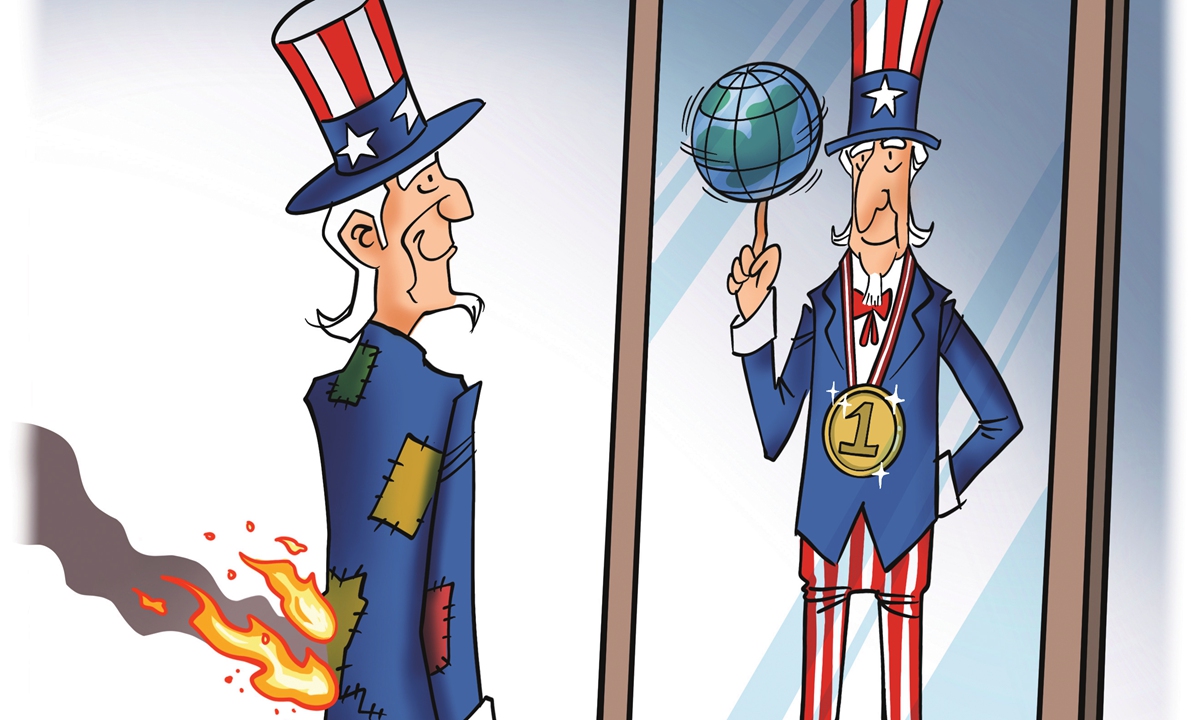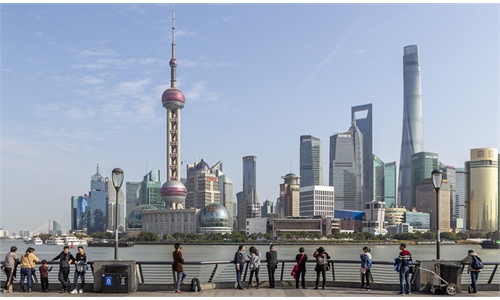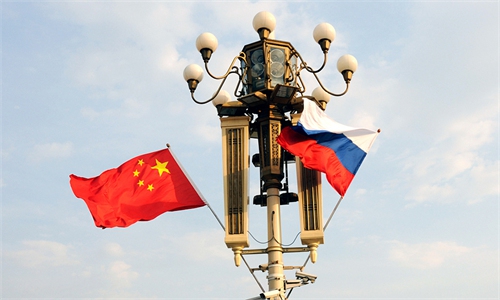
Illustration: Liu Rui/GT
"It does not seem far-fetched to claim that future generations will consider the ongoing Russo-Ukrainian War as one of the meaningful moments in the shift of the balance of power from West to East," wrote Italian scholar Lorenzo Kamel on the National Interest. The Russia-Ukraine conflict, which has lasted nearly three months, is profoundly changing the world pattern. As discussions over how it will affect the world order have gone deeper, it's increasingly believed that the war and the developments surrounding it represent the beginning of the end of the unfair world order dominated by the US and the West, and is a prelude to the establishment of a new international order.
Unfair order triggers conflicts
Since the end of the Cold War, the US has been using every possible means to maintain the established order dominated by the US and the West.
The order desired by the US is one based on ideology under which the US reigns supreme and non-Western countries are considered inferior and demanded to follow the US.
Fyodor Lukyanov, director of research at the Valdai International Discussion Club, argued that Moscow has positioned itself as an "agent of cardinal change for the whole world," saying the military operations launched by Putin spelled the end of an epoch in the state of global affairs.
Lukyanov's view is echoed by Zhang Weiwei, director of the China Institute of Fudan University. Zhang called Russia a revolutionary to reshape the world order. He believes besides seeking to achieve the "demilitarization and de-Nazification" of Ukraine, Moscow has a deeper purpose by launching military operations against Ukraine: Russia wants to overthrow the post-Cold War unipolar world order dominated by US hegemony, foster the establishment of a new multi-polar order in which Russia will be a key polar.
Neither Russia nor a vast number of non-Western countries, including China, "will agree with the rules-based world where the rules were created by the West and imposed on our countries without our consent," Oleg Ivanov, Vice-Rector of Research, Moscow-based Diplomatic Academy, told the Global Times, emphasizing those countries are aimed at equal and fair rules based on international law and the UN Charter in particular.
Real international community
Since the outbreak of the Russia-Ukraine conflict, the US has attempted to rope in allies and other countries to impose sanctions on Russia, willfully trampled on the UN-centered international system and the international order based on international law to fuel the escalation of conflicts for its private ends. "The conflict revealed the true face of the US and the West. The West does not feel obliged to stick to international agreements," said Oleg, citing the unbridled actions of Western countries freezing Russian currency reserves in their banks, seizing the property of Russian citizens abroad and imposing illegal sanctions on them.
While the Western countries slapped sanctions on Russia, non-Western countries have disapproved of and not participated in the sanctions regime. More than 140 countries of the 190 or so UN member states refused to follow the West's lead in sanctioning Russia, the population of which accounts for the majority of the world's population. It's fair to say when it comes to the issue of sanctioning Russia, the US and its allies are the isolated and marginalized group in the international community.
For quite a long time, the US has abused its military and dollar hegemony to arbitrarily wage wars against and impose sanctions on others, seriously damaging the interests of all countries in the world. More and more people have realized that the US is the biggest disruptor to world stability and there is a need to reshape the world order dominated by the US that serves US hegemony.
US-led unreasonable order will collapse
The Russia-Ukraine conflict will quicken the end of the US-led world order. It has challenged the unreasonable existing world order in aspects such as finance and security. "The US abused its dollar hegemony, pushing Russia and other non-Western countries to use their national currency in foreign trade. The irony is that the US speeds up the process of abandoning the dollar as a universal currency for payments," said Ivanov. He noted the trade landscape is going to change and diminish the role of Western currencies.
Zhang Tengjun, deputy director of the Department for Asia-Pacific Studies at the China Institute of International Studies, told the Global Times that the US and the West's abuse and weaponization of sanctions will also lead the current international currency and financial system into a crisis of legitimacy.
In terms of security, when Western countries represented by the US are stuck in a cold war mindset and zealously engage in unilateral sanctions and form small circles, the vast majority of non-Western countries represented by China and Russia oppose power politics and bloc confrontation and advocate true multilateralism.
"In the future, more global attention will be paid to strengthening the UN's role and how to avoid geopolitical conflicts being kidnapped by certain major powers' interests," Zhang said. The Global Security Initiative recently proposed by China has aroused strong resonance and support from the international community, and a security order that emphasizes common, comprehensive, cooperative and sustainable security will become more popular with non-Western countries, which will serve as the biggest driving force to overthrow the unreasonable US-led order.
The author is a reporter with the Global Times. opinion@globaltimes.com.cn



